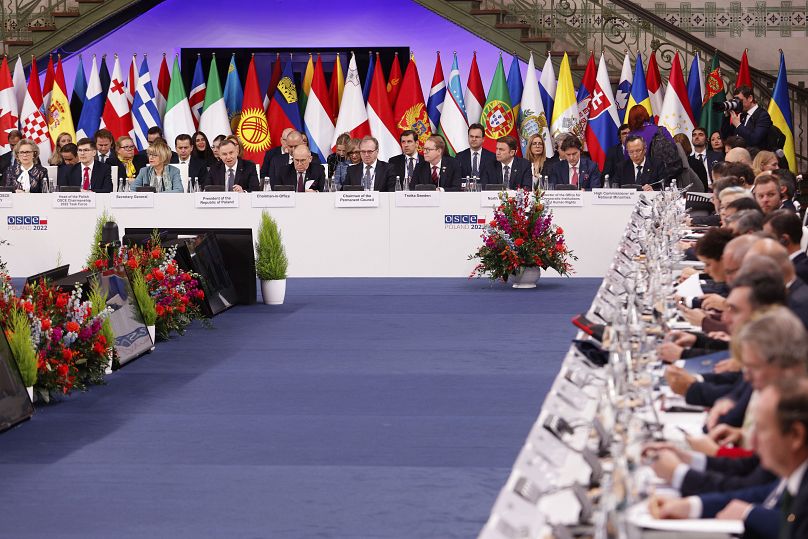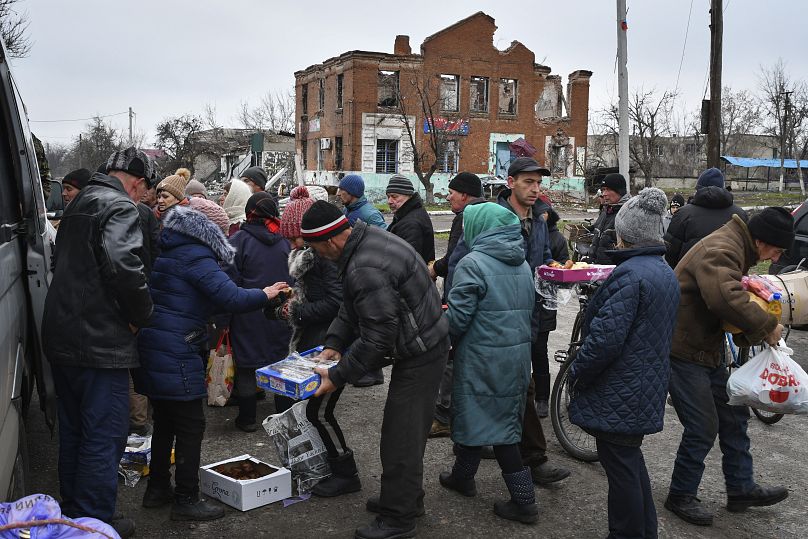Here is our summary of the latest news around Russia's war in Ukraine.
1. 40% of Ukraine's electricity network still out of order
Nearly half of Ukraine's electricity network is still out of action one week after Russian missile strikes hit the country's energy infrastructure.
 ADVERTISEMENT
ADVERTISEMENT
 ADVERTISEMENT
ADVERTISEMENT
The private operator DTEK said on Thursday that electricians were working "day and night" to repair the damage.
"Russia destroyed 40% of Ukraine's energy system with terrorist missile attacks," a statement read on Telegram.
"Electrical engineers are doing everything possible and impossible to stabilise the energy supply situation," DTEK added.
Millions of people were left without power and water after a barrage of Russian rockets hit cities across Ukraine, including the capital Kyiv. Ukrainian officials have warned citizens to prepare for fresh missile strikes as winter officially begins.
The regional governor of Kherson said the recently liberated city had lost its power supply on Thursday after heavy Russian shelling.
Nearly six million customers in a majority of Ukraine's regions and in Kyiv had no electricity, Ukraine President Volodymyr Zelenskyy said on Wednesday night.
Many citizens have to resort to alternative solutions to heat their homes, such as using candles or generators.
On Wednesday, Ukraine's state emergency service said at least nine people had died and eight others were injured in fire accidents as people broke safety rules.
"Generators on balconies, gas cylinders in apartments, lit candles ... due to violations of fire safety rules, the use of uncertified products for heating and cooking, incidents of fires and explosions in high-rise and private buildings have become more frequent," the authority said.
Weather forecasters said the temperature in the capital Kyiv would fall to minus 6 degrees Celsius overnight on Thursday.
Russian has denied targeting civilians and says Kyiv's failure to negotiate a peace deal is to blame for their strikes on Ukraine's energy infrastructure.
On Thursday, Ukrainian foreign minister Dmytro Kuleba called on the West to sanction Russia's missile production industry.
The EU's foreign policy chief Josep Borrell said the bloc would examine "all legal possibilities" to force Russia to pay for the damage in Ukraine.
2. US and NATO directly involved in Ukraine, says Lavrov
Russia’s foreign minister has accused the West of becoming directly involved in the Ukraine war by supplying Kyiv with weapons and training its soldiers.
Sergey Lavrov also said that Russia’s strikes on Ukrainian energy facilities were intended to weaken Ukraine’s military potential and derail the shipments of Western weapons.
“You shouldn't say that the U.S. and NATO aren’t taking part in this war, you are directly participating in it,” Lavrov told reporters in a video call.
“And not just by providing weapons but also by training personnel. You are training their military on your territory, on the territories of Britain, Germany, Italy, and other countries.”
Ukraine and its Western allies have accused Russia of targeting key civilian infrastructure to force peace talks.
Lavrov also criticised Pope Francis after he described the actions of Russian minority soldiers in Ukraine as "cruel".
"Pope Francis recently made statements that are not at all understandable, absolutely not Christian, pointing to two peoples of Russia, to say that we should expect atrocities from them during military battles," the Russian foreign minister said.
"It does not help the authority of the Holy See," he added.
Russia has been accused of disproportionately mobilising men for Ukraine from ethnic minorities, including Chechens from the Caucasus and Buryats from Siberia.
On Thursday, Lavrov was banned from attending the first high-level meeting of Europe's largest security organisation since Russia invaded Ukraine.
The Organization for Security and Cooperation in Europe (OSCE) -- which previously acted as a mediator in Ukraine before the war -- met in the Polish city of Lodz.
Lavrov also slammed his ban, accusing Warsaw of "destroying the last remains of the consensus culture".
The Polish chairman in office, foreign minister Zbigniew Rau, said he had a responsibility to defend the OSCE's “fundamental principles”.
3. 50 prisoners of war exchanged as Russia reportedly pulls back forces
Russia and Ukraine have each confirmed that 50 prisoners of war were exchanged on Thursday.
Andriy Yermak, the head of Ukraine's presidential administration, said 50 "protectors of Ukraine" had been released, including "defenders of Mariupol and Azovstal".
The Russian-installed official in the Donetsk region also confirmed the swap and said the 50 Russian service personnel would be flown to Moscow for medical checks and rehabilitation.
Neither Russia nor Ukraine have released official figures on how many prisoners of war they have taken since the invasion began.
Ukraine's President Volodymyr Zelenskyy said that Russia had now freed a total of 1,319 prisoners since March.
The latest exchange came amid reports that Russia had pulled some troops from near Kherson city, on the eastern bank of the Dnipro river.
Ukraine's military claimed that Moscow's forces had withdrawn from the frontline but were still shelling Kherson.
"A decrease in the number of Russian soldiers and military equipment is observed in the settlement of Oleshky," the military said on Thursday. The claims could not be immediately verified.
Russian troops left Kherson last month after nine months of occupation, with many redeployed to battlefields in eastern Ukraine.
Kyiv also claimed that recent Russian attacks had included dud missiles, in an apparent effort to distract Ukrainian air defences.
4. Ukrainian company sacks new director of Zaporizhzhia nuclear plant
The Ukrainian nuclear operator Energoatom says it has dismissed the new director of the Zaporizhia power plant.
Yuri Chernichuk was only appointed to head Europe's largest nuclear facility on Wednesday after accepting a proposal by Russia.
Moscow's forces have occupied the plant since March and said in October it was putting the plant under Russian control.
Energoatom said Chernichuk had "betrayed Ukraine and sided with the enemy" and repeated calls for workers not to collaborate with Russia.
"Instead of taking all efforts to liberate the station as fast as possible, he decided to help the Russian occupiers legalise its criminal seizure and is now inciting other atomic workers to do this," Energoatom chief Petro Kotin said in a statement.
Kotin also said that Chernichuk would soon answer for his actions "before the law and before the people".
Energoatom claims that Russia has used "pressure", "intimidation" and "blackmail" to try and force Ukrainian workers at Zaporizhzhia to sign new contracts.
On Monday, Ukraine said Moscow had banned Ukrainian technicians from entering the facility if they refused to work with Russia's atomic energy firm, Rosenergoatom.
Chernichuk was the chief engineer of the Zaporizhzhia facility and said it was the "only possible and correct decision" for him to manage the plant.
"We have done and are doing the possible and the impossible to ensure that the world does not experience new [accidents] Fukushima and Chernobyl," he said in the statement.
Both Ukraine and Russia have accused each other of shelling near the facility, prompting fears of a nuclear disaster.
The UN's International Atomic Energy Agency (IAEA) has repeatedly condemned the "unacceptable" missile strikes near the plant.
According to Kyiv, Russia has positioned 500 soldiers at the Zaporizhzhia plant. The six-reactor facility has not been producing electricity since September.
5. Xi Jinping and Charles Michel call for Ukraine de-escalation
European Council President Charles Michel has called on Chinese President Xi Jinping to exert his influence over Russia to end the war on Ukraine.
Michel's spokesman had earlier said that "both leaders stressed that nuclear threats are irresponsible and highly dangerous."
"President Xi made very clear that China is not providing weapons to Russia,” Michel added.
Xi was quoted by state broadcaster CCTV as saying that “solving the Ukrainian crisis through political means is in the best interest of Europe and the common interest of all countries in Eurasia."
"Under current conditions, we must avoid escalation and expansion of the crisis and work for peace," Xi said.
The meeting in Beijing on Thursday came six weeks after 27 EU leaders held a three-hour-long strategic discussion on China.
Michel's demands echoed the words of German chancellor Olaf Scholz, who visited Xi in Beijing last month.
Read the full story here.
6. UN makes record humanitarian aid appeal amid Ukraine war
The United Nations has asked member states for a record $51.5 billion (€49.0 billion) in aid funding for next year.
The global body's humanitarian office said the funds are needed to help 339 million people in 69 countries -- an increase of 65 million people compared with the same time last year.
The appeal for humanitarian support is a 25% increase on that made for 2022, it added.
“Humanitarian needs are shockingly high, as this year’s extreme events are spilling into 2023,” said the UN's emergency relief coordinator, Martin Griffiths.
Griffiths cited the war in Ukraine as one event that has pushed the number of displaced people worldwide above 100 million.
“All of this on top of the devastation left by the pandemic among the world’s poorest,” said Griffiths.
“For people on the brink, this appeal is a lifeline. For the international community, it is a strategy to make good on the pledge to leave no one behind.”
7. Switzerland freezes over €7 billion in financial assets under Russia sanctions
Swiss authorities say they have frozen financial assets worth 7.5 billion Swiss francs (€7.6 billion) under sanctions against Russia.
The country has routinely adopted European Union sanctions on Moscow following its invasion of Ukraine in February, but pressure has been mounting on authorities.
Switzerland is a popular destination for Russia's elite and a holding place for Russian wealth.
The State Secretariat for Economic Affairs (SECO) said on Thursday that they were aware of Russian assets in the country worth 46.1 billion Swiss francs (€46.6 billion).
A further 294 “business relationships” with Russia's close ally, Belarus, were worth 400 million Swiss francs (€405 million), it added.
SECO also stated that 15 properties in six cantons had been "blocked" in addition to frozen financial assets.
Until July, Switzerland said it had frozen Russian financial assets worth 6.7 billion Swiss francs (€6.78 billion).
The European Commission has proposed a plan to confiscate frozen Russian assets, although Switzerland currently has no legal basis to take this step.
EU member states have already frozen €19 billion in assets belonging to Russian oligarchs and some €300 billion in Central Bank of Russia reserves are blocked in the EU and other G7 countries.












